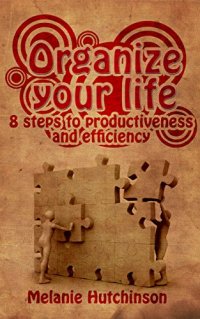{Book Title}
Free bonus inside! (Right After Conclusion) – Get limited time offer, Get your BONUS right NOW!
Are you constantly stressed out? Do you feel like you are putting out fires all day long? Do you spend a lot of time looking for things when you could be doing something else? Are you always running late?
These are all signs that you need to get organized. Enter Melanie Hutchinson and her book Organize Your Life: 8 Steps to Productivity and Efficiency. She will get you moving more smoothly at school, work and home.
Hutchinson begins your new design for efficiency first thing in the morning by making sure you get in the right frame of mind. Attitude is in fact everything! Getting the day started in a good mood can increase your efficiency by 10%, even if you do nothing else to improve your systems!
Organize Your Life reexamines the cultural norm that we must work at all waking moments in order to get the most done in a day. Actually, for the vast majority of people, our efficiency drops off sharply after a certain amount of time each day. What that means is that we need to take frequent breaks throughout the day when we arrive at appropriate stopping points in our projects.
Interestingly, Hutchinson introduces the concept of diet as another important factor in our personal efficiency. While we don’t hear about this from many other sources, it makes sense: if I gorge on caffeine and sugar, I may initially feel “wired” but then I’m in for a sugar crash later. Instead, a diet that incorporates a balance of carbohydrates, protein and fats will provide you sustained energy throughout your work day.
Then Organize Your Life takes readers to the mental aspect of flexibility. When we aren’t rigid about our work styles, we can get more done. For example, if I pack some items to read or work on while I’m forced to wait somewhere, I’m still being productive (instead of stewing about having to wait). When we make lists of things we would like to get done within the day, we can refer back to it frequently to check our progress, and gauge what still needs to be done.
No organizing book in this age is complete without addressing technology, and Hutchinson dives into this field without flinching with some great suggestions for decreasing distraction while still using the devices you rely on.
One of Organize Your Life’s best chapters in on balancing the types of work we face each day. Hutchinson explains that there’s work that requires quiet, extended, concentrated effort, and then the smaller tasks that still need doing (responding to voicemails and emails, running errands, etc.). By planning our day with the two different types of work we’ll face, we can plan for the best times to do both types of tasks. We can then schedule those breaks that we need to refresh throughout the day as well.
Hutchinson’s book is very useful because it approaches organization from many different angles, allowing readers to see which dimension makes the most immediate impact.
***Limited Edition***





